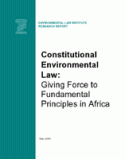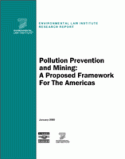
Research Reports
ELI publishes Research Reports available for free download that present the analysis and conclusions of the policy studies ELI undertakes to improve environmental law and policy. These reports contribute to education of the profession and disseminate diverse points of view and opinions to stimulate a robust and creative exchange of ideas. Those publications, which express opinions of the authors and not necessarily those of the Institute, its Board of Directors, or funding organizations, exemplify ELI’s commitment to dialogue with all sectors.This article, which originally appeared in the May 21, 2000, issue of Environment Reporter, examines data from the first four years of the Acid Rain Program as to the effects of trading on localized pollution levels. These indicate that the effects of trading have been minimal in regards to hot spots, and likely even positive. On a regional level, no significant trends can be discerned in the flow of trade allowances, and net interregional trades of allowances constitute only 3 percent of all allowances used.
Read More >
This research report explores how African constitutional provisions can be utilized to create real, enforceable environmental rights. African countries do have different legal traditions, namely, common law, civil law, and Islamic law, as well as some hybrid systems. Nevertheless, these legal systems share many common underlying principles and values, particularly fundamental human rights that are embodied in their respective constitutions.
Read More >
There are compelling reasons for Inter-American collaboration in developing a hemispheric framework for pollution prevention in hard rock mining. Trade and investment in this sector are expanding. Many of the natural resources potentially threatened by mining have common characteristics or are shared by countries. Mining companies are operating as multinationals. An Inter-American approach to environmental regulation helps to set a common playing field as well as avoids the complexity of having different standards in different regions.
Read More >The environmental impacts of hard rock mining can be highly adverse if the proper pollution prevention technology and regulatory framework are not in place and properly functioning. Pollution prevention as a strategic management principle offers the opportunity to avoid or minimize significant environmental impacts of hard rock mining while also identifying and promoting economy and efficiency in the design and operation.
Read More >
This report explains the process, problems, and rewards of redeveloping brown-fields. Chapter 1 answers key questions about brownfields and discusses some of the reasons that property owners should consider cleaning up and redeveloping their brownfield proper-ties. The following chapters of the guidebook explain the brownfield cleanup and redevelopment process and the issues that property owners may need to address.
Read More >